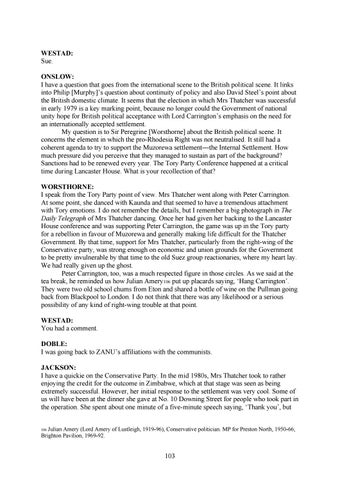WESTAD: Sue. ONSLOW: I have a question that goes from the international scene to the British political scene. It links into Philip [Murphy]’s question about continuity of policy and also David Steel’s point about the British domestic climate. It seems that the election in which Mrs Thatcher was successful in early 1979 is a key marking point, because no longer could the Government of national unity hope for British political acceptance with Lord Carrington’s emphasis on the need for an internationally accepted settlement. My question is to Sir Peregrine [Worsthorne] about the British political scene. It concerns the element in which the pro-Rhodesia Right was not neutralised. It still had a coherent agenda to try to support the Muzorewa settlement—the Internal Settlement. How much pressure did you perceive that they managed to sustain as part of the background? Sanctions had to be renewed every year. The Tory Party Conference happened at a critical time during Lancaster House. What is your recollection of that? WORSTHORNE: I speak from the Tory Party point of view. Mrs Thatcher went along with Peter Carrington. At some point, she danced with Kaunda and that seemed to have a tremendous attachment with Tory emotions. I do not remember the details, but I remember a big photograph in The Daily Telegraph of Mrs Thatcher dancing. Once her had given her backing to the Lancaster House conference and was supporting Peter Carrington, the game was up in the Tory party for a rebellion in favour of Muzorewa and generally making life difficult for the Thatcher Government. By that time, support for Mrs Thatcher, particularly from the right-wing of the Conservative party, was strong enough on economic and union grounds for the Government to be pretty invulnerable by that time to the old Suez group reactionaries, where my heart lay. We had really given up the ghost. Peter Carrington, too, was a much respected figure in those circles. As we said at the tea break, he reminded us how Julian Amery 106 put up placards saying, ‘Hang Carrington’. They were two old school chums from Eton and shared a bottle of wine on the Pullman going back from Blackpool to London. I do not think that there was any likelihood or a serious possibility of any kind of right-wing trouble at that point. WESTAD: You had a comment. DOBLE: I was going back to ZANU’s affiliations with the communists. JACKSON: I have a quickie on the Conservative Party. In the mid 1980s, Mrs Thatcher took to rather enjoying the credit for the outcome in Zimbabwe, which at that stage was seen as being extremely successful. However, her initial response to the settlement was very cool. Some of us will have been at the dinner she gave at No. 10 Downing Street for people who took part in the operation. She spent about one minute of a five-minute speech saying, ‘Thank you’, but Julian Amery (Lord Amery of Lustleigh, 1919-96), Conservative politician. MP for Preston North, 1950-66; Brighton Pavilion, 1969-92. 106
103
